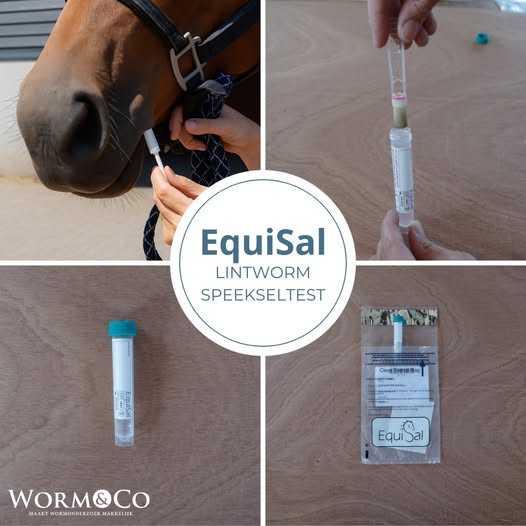The EquiSal tapeworm test is an innovative saliva test that shows whether your horse has a harmful tapeworm infection.
The test is user-friendly. The horse owner can collect the saliva sample using the supplied swab, which changes color once enough saliva is collected. The EquiSal saliva test can be used for all horses.
What does the test measure?
The EquiSal tapeworm test measures the level of specific antibodies against tapeworms. The test consists of 3 components, taking into account the horse’s saliva production and diet.
Why choose EquiSal?
By using the EquiSal saliva test, you can rule out a tapeworm infection and avoid preventive deworming for tapeworms. This means your horse doesn't receive unnecessary medication, which helps maintain its immunity and reduces the risk of resistance.
How many horses currently have a harmful tapeworm infection?
Initial results with the EquiSal tapeworm test show that 30% of tested horses need treatment. This also means that 70% of horses, which would otherwise receive a standard tapeworm treatment (“blind treatment”), did not actually need it. The EquiSal test was also used at a stud farm that regularly conducted fecal tests. There, only 12% of the horses had a harmful tapeworm infection – that’s 1 in 8. This means many horses are treated unnecessarily.
When should you treat?
If the test result is positive. It is known that infections with more than 20 tapeworms are harmful. However, there is no evidence that lower tapeworm burdens do not require treatment. Therefore, it is currently advised to treat every tapeworm infection.
Why not just use manure testing?
Because tapeworms release eggs in packets, manure testing is not reliable for detecting tapeworms. Occasionally, we may find tapeworm eggs in a regular fecal test, but these are considered coincidental findings. All it tells you is that the horse has tapeworms. On the other hand, if no eggs are seen, we cannot conclude that the horse is worm-free. Since the tapeworm releases its eggs in packets, there is no clear correlation between egg presence and the severity of infection, unlike other intestinal worms.
What should you pay attention to when taking the EquiSal tapeworm test?
The test is user-friendly and easy to perform yourself. It's important that the horse does not eat, drink, or exercise for at least half an hour before collecting the saliva sample. Also, the horse should not have been treated for tapeworm in the 4 months prior to testing.
How often should you perform the EquiSal tapeworm test?
We recommend testing twice a year for tapeworm. The best times are late autumn and late winter/early spring. Of course, you can use the test year-round.
How long can the EquiSal tapeworm test be stored?
The special storage solution was developed in collaboration with a human diagnostics lab specializing in saliva testing. Its stability has been thoroughly tested. The saliva sample can be sent by post without issue and remains stable for at least three weeks in the solution.
Order the EquiSal tapeworm test here.

